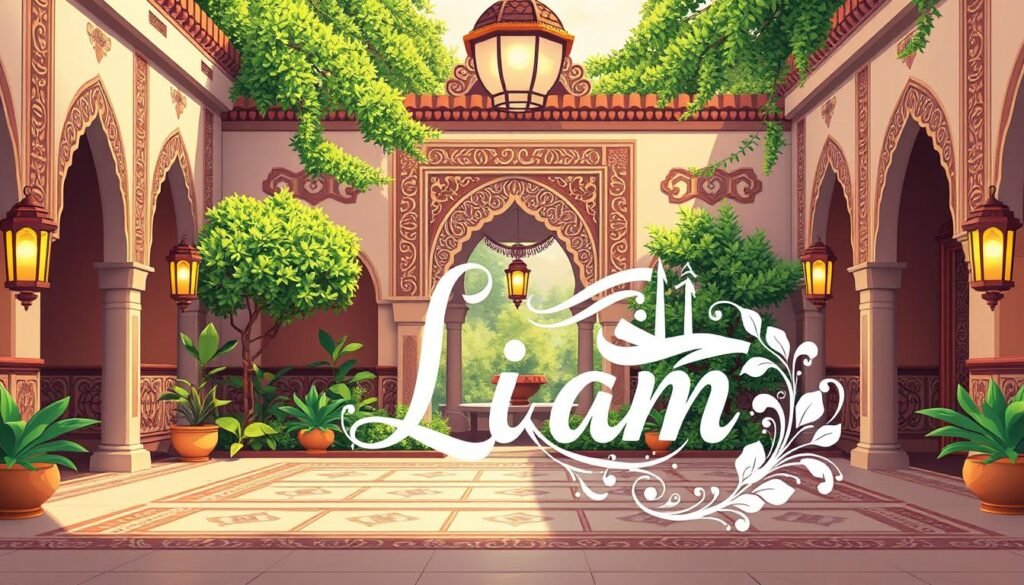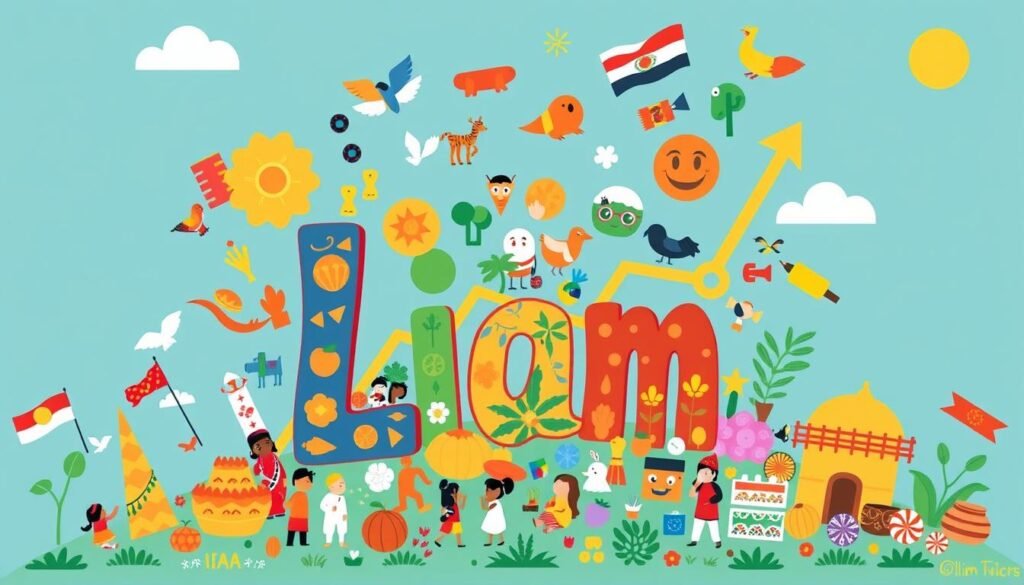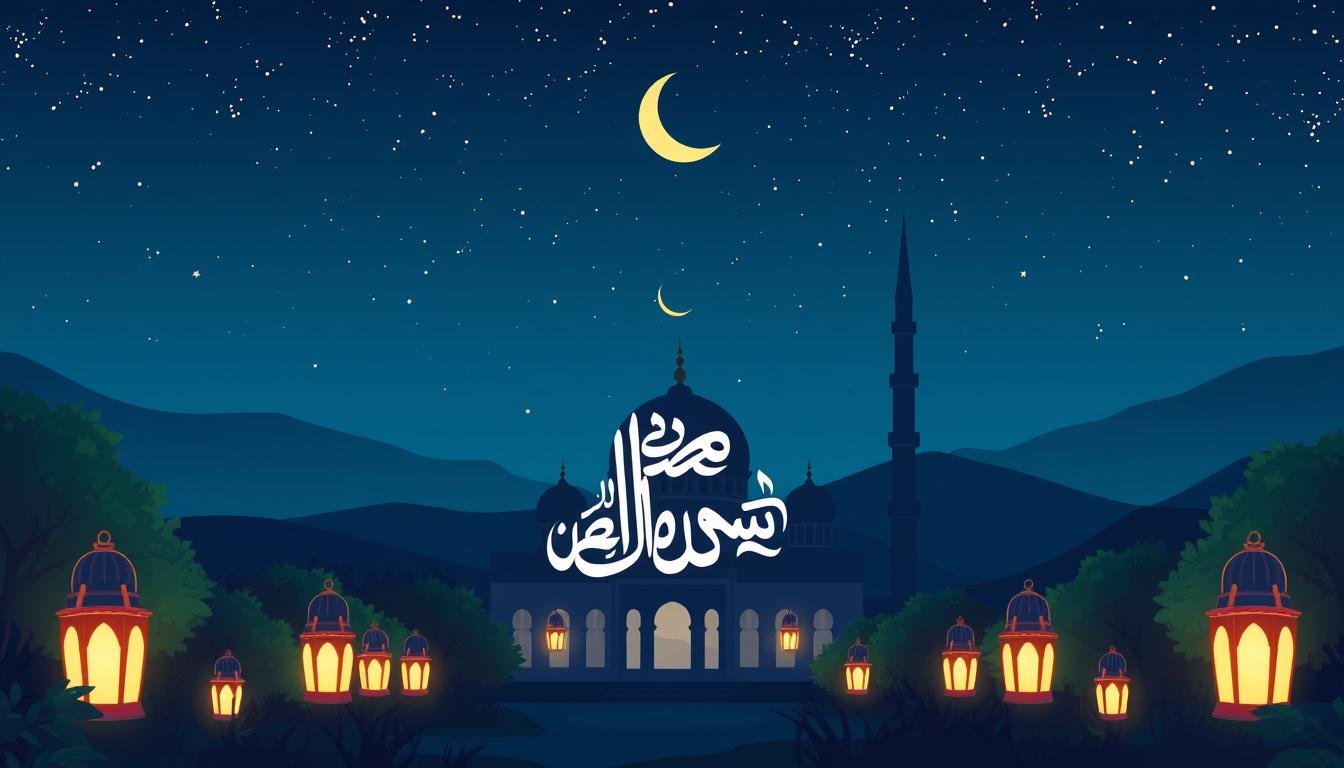Is the name Liam just a sign of Irish roots, or does it link to Islamic naming traditions? This question makes us think about Liam’s origins. It’s seen as a strong name from the Gaelic Uilliam.
Liam has deep Irish roots. Yet, it also fits into today’s world. We’ll look into Liam’s cultural importance, its history, and if it’s a Muslim name. We’ll also see how it stands in Islamic naming.
The Origins of the Name Liam
The name Liam has deep roots in both Irish and Germanic traditions. It carries a rich history and meaning. Knowing where the name comes from shows its Irish heritage of Liam and its wider impact across cultures.
Irish Heritage and Meaning
Liam comes from the Gaelic name Uilliam. It means loyalty and protectiveness. In Irish culture, Liam stands for honor and being steadfast. This makes it a popular choice for families wanting to connect with their Irish heritage of Liam.
Germanic Roots of the Name
Liam also has Germanic roots, linked to William. It means nobility and leadership. This shows Liam’s importance in both cultures, symbolizing honor and responsibility.
Understanding the Religious Context of the Name Liam
The name Liam comes from cultural exchanges and religious influences. Islamic naming practices focus on names’ meanings and significance. Liam doesn’t directly relate to Islam but has a positive meaning. This makes it acceptable in Islamic naming.
Islamic Naming Conventions
In Islam, names are picked for their meanings and morals. Liam comes from Irish and English cultures but is widely accepted. It fits well with Islamic values, making it a good choice for Muslim families.
Influences from Christianity
Christianity has shaped naming traditions, creating a rich cultural mix. Liam, from William, has Christian roots. This shows how cultures blend, enriching naming practices across faiths.
This mix highlights Liam’s role in connecting different backgrounds. For more on Liam’s meaning, click here.

Is Liam A Muslim Name?
Looking into if Liam is a Muslim name means checking out different cultures and beliefs. An Islamic name analysis shows Liam isn’t in the Quran. But, its effects and changes in Islamic groups need more study.
Analysis of Quranic Context
Liam doesn’t have Islamic roots, as seen in the Quran. This is key for many Muslim parents picking a name. But, there are Islamic names like Liham, meaning “wise.” This shows how names relate to faith.
Comparative Names in Islamic Tradition
Names like Liham and others share Liam’s good qualities. Names like Aidan and Kieran, though not Islamic, share values Islamic culture likes. The acceptance of names changes in different communities. This shows Liam might not be a typical Islamic name, but there are many other good options.
The Meaning of the Name Liam
The name Liam has deep meaning, especially from its Irish roots. It means “strong,” which fits well with the traits of strength people look for in names. Liam stands out as a name that shows resilience and bravery, making it a great choice for parents.
Strong as a Defining Trait
Liam’s meaning is all about strength. It’s linked to qualities like durability and protection. Many see the value in names that show strength, like Liam, as a way to build a strong identity.
Associations with Bravery and Courage
Choosing a name like Liam is a tradition that goes back a long way. It’s seen as a symbol of courage, reminding us of heroes and protectors. Parents pick Liam hoping their child will be brave and strong, just like the name suggests.
Non-Quranic Names in Arabic
Arabic names show a blend of culture and language. Non-Quranic names like Liham and Lihem are great for parents looking for deep meanings. These names offer a unique choice for Muslim families.
The Use of Liham and Lihem
Liham means “wise.” Lihem also has positive meanings. These names are perfect for families wanting strength and smarts in their kids.
Implications of Non-Quranic Names
Choosing non-Quranic names shows how Muslim cultures are changing. Parents pick names that reflect their values and traditions. Names like Liham and Lihem show the value of personal choice and cultural respect.
The Popularity of the Name Liam
The name Liam has become very popular worldwide. It shows a trend in choosing names that are liked by many. Liam’s popularity has grown over time, attracting people from different cultures.
Global Usage Statistics
In many countries, Liam is a top choice for boys’ names. Its global appeal is seen in places like New Zealand, Canada, and the US. It’s a name that parents love for its strength and charm.
Rankings in the United States
In the US, Liam’s popularity has soared. It was ranked 947th in 1967 but jumped to 2nd by 2015. This shows a big rise in its popularity over the years.
There are about 155,588 people with the name Liam in the last century. This shows Liam has become a favorite in many American families. Its rise in popularity shows it’s more than just a name; it’s a cultural trend.

Perspectives from Muslim Parents
Muslim parents have to choose names that honor their culture and follow Islamic rules. They want names that show their identity and have deep meanings. These choices help shape their values and beliefs as they start their parenting journey.
Desire for Acceptable Names
Muslim parents pick names based on tradition, meaning, and modern trends. Names that show Islamic values make them proud and connect them to their faith. For example, they choose names that mean strength, kindness, and wisdom.
These stories show the deep thought behind naming. Many parents pick names they think will teach their kids good qualities.
Personal Stories and Experiences
Many families share their stories about choosing names like Liam. They talk about how the name fits with their culture and community’s expectations. This journey can lead to discussions and sometimes misunderstandings about names that don’t follow traditional patterns.
Despite these challenges, parents look back on their naming journey with warmth. They highlight their dedication to teaching their kids about their faith and history through these choices.
Comparisons with Other Names
The name Liam has become very popular in the US since 2017. It has topped the charts every year. Famous Liams like Liam Neeson and Liam Gallagher have made the name popular.
These famous people have shown the name’s strength and charm. This has made Liam a top choice for parents.
Famous People Named Liam
Many celebrities have been named Liam. They have made the name even more appealing. These famous Liams have shown bravery and resilience.
Parents want to give their kids these qualities. So, they choose Liam for its strong image.
Alternative Names with Similar Meanings
If you like Liam, you might also like Aiden, Logan, and Landon. These names mean ‘fiery one,’ ‘little hollow,’ and ‘long hill.’ They share Liam’s themes of strength and protection.
As naming trends change, names like Lysander and Lucas are becoming popular. They offer a wide range of choices for parents.
FAQ
Is Liam considered a Muslim name?
What is the Irish heritage associated with the name Liam?
Are there any Germanic roots for the name Liam?
What do Islamic naming conventions emphasize?
Does the name Liam have any connections to Christianity?
Is the name Liam mentioned in the Quran?
What does the name Liam mean?
How does the name Liam relate to bravery?
What are some non-Quranic Arabic names?
How popular is the name Liam globally?
What do Muslim parents look for in naming their children?
Who are some notable figures named Liam?
What are alternative names with similar meanings to Liam?

Embracing Faith, One Insight at a Time!
The teachings of the Quran have always guided my path. With a deep passion for Islamic knowledge, I strive to blend the wisdom of tradition with the relevance of today, making the timeless messages of Islam accessible and meaningful for everyone.
Muslim Culture Hub is my platform to share historical insights and thought-provoking articles, exploring both well-known and lesser-discussed aspects of Islamic culture and beliefs. My mission is to create an inclusive online space where everyone can learn, strengthen their faith, and connect with the profound message of Islam.
Join the journey!
May peace be upon you.








